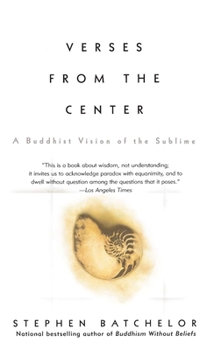Verses from the Center: A Buddhist Vision of the Sublime
Select Format
Select Condition 
Book Overview
"A Buddhist scholar and former monk, Stephen Batchelor is well known to American readers as the author of the bestselling Buddhism Without Beliefs . Now comes Verses from the Center, his vision of the... This description may be from another edition of this product.
Format:Paperback
Language:English
ISBN:1573228761
ISBN13:9781573228763
Release Date:July 2001
Publisher:Penguin Adult Hc/Tr
Length:208 Pages
Weight:0.44 lbs.
Dimensions:0.6" x 5.1" x 8.0"
Age Range:18 years and up
Grade Range:Postsecondary and higher
Customer Reviews
5 ratings
Bachelor on Nargarjuna
Published by Thriftbooks.com User , 18 years ago
Stephen Bachelor is an excellent translator and interpreter of Nargarjuna's wisdom. His prose is clear and accessible and his translation of Nargarjuna's poetry inspired. This book is a must have for students of Mahayana Buddhism.
Verse from the Perimeter
Published by Thriftbooks.com User , 23 years ago
I bow to Batchelor Who teaches emptiness (Not in Tibetan, not in Sanskrit, Not with neologisms, not with cliches, Not for Mensa, not for dummies, Neither adorned, nor stripped) And sees Nagarjuna.
Fascinating, Original, Problematic
Published by Thriftbooks.com User , 24 years ago
There is much about Stephen Batchelor's new translation of Nagarjuna's Mulamadhyamakakarika which is extremely useful, although the work is also highly problematic. Batchelor has chosen to render Nagarjuna's verses in a very free fashion, communicating what he discerns to be the real message at the heart of the Karikas. He has felt free to omit material, paraphrase, summarize, and reword entire sections with enormous liberty. On the one hand this has freed the text from much of its cryptic quality which has resulted from the metrical constraints of the Sanskrit root text. On the other hand we must rely heavily on Batchelor's interpretation of what Nagarjuna actually meant. What did Nagarjuna actually mean? Batchelor sets forth his interpretive model in the lengthy and challenging introduction. Nagarjuna, Batchelor argues, should be interpreted as belonging to a common philosophical heritage. In comparing Nagarjuna's text with the writings of Taoism and Zen and even the English Romantic poets, Batchelor suggests that the Verses espouse a common insight which is far broader than many modern interpreters have suggested. It seems probable that the unspoken opponent of his exegesis is the Gelukpa and Gelukpa-inspired scholarship which has had much to say about Madhyamaka in recent years, and of which Batchelor himself was once a part when he translated Chandrakirti's Madhyamakavatara with Geshe Rabten in Echoes of Voidenss. Here, he briefly presents Dzong-ka-ba's view on Nagarjuna, which Batchelor clearly thinks is overly scholastic and removes the heart of the message by viewing emptiness as primarily a kind of anti-metaphysics. The real message, we learn, is that we are to approach the world with a particular stance of openess and sense of interconnectedness. Emptiness is to be lived in its realization, not realized propositionally. Clearly Batchelor has been deeply influenced by his experiences with Zen in this approach, and it has much to offer in considering the relationship of emptiness to the endeavor of liberation. This work is obviously highly personal, and highly personalizes the process of meditation on emptiness. That being said, I found the book to contain significant problems. In my opinion it behooves Batchelor to spend more energy in the introduction in justifying his beliefs. I do not see why we should necessarily believe that Nagarjuna is best read through the existential model that Batchelor suggests. This certainly flies in the face of many of his Indian commentators such as Aryadeva, Chandrakirti, Buddhapalita, and Bhavaviveka. I see no reason to assume that, on the basis of stylistic and rhetorical affinities, we should view Nagarjuna as belonging to the family of thought that somehow includes Chuang-Tzu and Keats rather than as belonging to the milieu in which he lived and wrote. "Verses" is clearly more of a presentation of Batchelor's views than an argument on their b
Another Batchelor masterpiece...
Published by Thriftbooks.com User , 24 years ago
I must admit that I realized only after a complete first read that this book had made its amazing impression on me. I thought as I was reading it that it was, well, interesting. It was only after reading it that I realized I was seeing life through an entirely different lens. It was an indescribable, incredible experience. I've read it twice since, and each time the feeling grows stronger. The book has allowed me to begin to experience emptiness, rather than try to understand emptiness.
A Wonderful Book!
Published by Thriftbooks.com User , 24 years ago
Nagarjuna's philisophy of the "middle way" can be difficult. It has usually been left to discussion by academics. Stephen Batchelor, as in his other writings, makes this subject flow like the poetry it is. It permeates your whole being. The author's helpful commentary and analysis makes this book a "keeper." It is for anyone interested in the Buddhist path and its profound reflections on life and living. "In seeing things To be or not to be Fools fail to see A world at ease."






